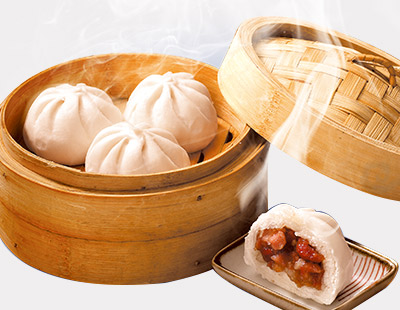宋代《太平广记》中记载了一段唐朝逸事:在武周时期,有一位侍御史名叫侯思止。他吃饭时每每叮嘱厨师:“与我作笼饼,可缩葱作。”也就是让厨师少加点葱,多加点肉。人们于是送他一个外号,叫“缩葱侍御史”。可见肉和葱在唐代便已成为包子馅的经典搭配。
In the "Taiping Guangji" of the Song Dynasty, a Tang Dynasty anecdote was recorded: during the Wu Zhou period, there was a palace attendant named Hou Sizhi. When he eats, he often instructs the chef: "Make a pancake with me, you can make it with scallions." This means that the chef adds less scallions and more meat. So people gave him a nickname, called "Shoucong Shishi". It can be seen that meat and scallions have become a classic pairing of steamed bun filling in the Tang Dynasty.
葱肉包子在宋代大概也很受欢迎。宋人罗大经《鹤林玉露·镂葱丝》中提到,有位士大夫在京城买了个妾室,自称曾在宰相蔡京府中的包子厨做事。一日,他让小妾做些包子来尝尝,没想到她推辞说自己不会做。士大夫很不高兴:“既然是包子厨里的人,怎么不会做包子?”小妾回答得理直气壮:“我是包子厨里专门负责切葱丝的。”一个包子而已,蔡京家的厨房却能细分出择菜、切葱丝、擀皮、包包子等不同工种来,就连小小的葱丝都要有专人负责,一方面说明蔡京对食物的讲究,另一方面也可见宋人喜欢以大葱入包子馅。
Scallion meat buns were probably also very popular during the Song Dynasty. According to the Song Dynasty scholar Luo Dajing's "Crane Forest Jade Dew - Cut Scallion Silk", a scholar bought a concubine in the capital and claimed to have worked at the steamed bun kitchen in the Prime Minister Cai Jing's mansion. One day, he asked his concubine to make some steamed buns to taste, but she refused and said she couldn't make them. The scholar was very unhappy and said, "Since I am from the steamed bun kitchen, why can't I make steamed buns?" The little concubine replied confidently, "I am the one in charge of cutting scallions in the steamed bun kitchen." Just a steamed bun, Cai Jing's kitchen can be divided into different types of work, such as selecting dishes, cutting scallions, rolling skins, and making steamed buns. Even small scallions need to be handled by a dedicated person, which indicates Cai Jing's emphasis on food, On the other hand, it can also be seen that Song people like to use scallions to fill buns.
不过,蔡京府里的肉包子,未必是猪肉,更有可能是羊肉。唐宋时期,羊肉一直是最常见的肉类,而猪肉的地位相对较低,往往只供平民百姓果腹。
However, the meat buns in Cai Jing's mansion are not necessarily pork, but more likely lamb. During the Tang and Song dynasties, lamb was always the most common meat, while pork had a relatively low status and was often only used as a means of food for the common people.

陈文蔚《克斋集》中记载,王安石热爱羊肉包子,时常边看书边吃。因为看得太过入神,也不用筷子,用手拿了就吃,吃得过多也浑然不觉,以至于闹肚子。
According to Chen Wenwei's "Ke Zhai Ji", Wang Anshi loves lamb buns and often eats them while reading. Because I was too engrossed in it and didn't use chopsticks, I ate it with my hands and didn't even notice it when I ate too much, which led to diarrhea.
“馒头”原本就是“包子”
"Mantou" was originally "steamed stuffed bun"
关于包子起源,最早的传说要追溯到先秦时期了。据说商纣王烹杀伯邑考,割去了四肢,万刃剁尸,做成肉饼(一说肉羹)赐给周文王,来试探一下他到底会不会掐算。文王由卦象得知爱子遭劫,翌日接到早餐却也装作浑然不知地吃下以骗取纣王,让纣王以为文王卜卦只是浪得虚名而已,这就是著名的周文王食子故事。到了《封神演义》里,演变成为纣王将伯夷考做成了人肉包子。当然,这仅仅是一种传说。因为到了汉代石转磨发明,人们才开始粒食到粉食,也就是吃上了面粉。
The earliest legend about the origin of baozi can be traced back to the pre Qin period. It is said that King Zhou of Shang cooked and killed Bo Yikao, cut off his limbs, chopped the body with ten thousand blades, and made meat cakes (such as meat soup) to give to King Wen of Zhou to test whether he could calculate. King Wen learned from the divination that his beloved son had been robbed. The next day, he received breakfast and pretended to eat it without knowing it, in order to deceive King Zhou into thinking that King Wen's divination was just a false name. This is the famous story of King Wen's son eating. In the "Romance of the Gods", it evolved into King Zhou turning the Boyi examination into a human flesh bun. Of course, this is just a legend. Because it was not until the invention of the stone mill in the Han Dynasty that people began to eat from grain to powder, that is, flour.
包子这种面食制品大约在魏、晋时便已经出现,但包子的原名却叫“馒头”。晋代束皙在《饼赋》中说,初春时的宴会上宜设“曼头”。 这里所说的“曼头”其实就是包子。唐人把它叫做“笼饼”。古人把面食统称为“饼”,如汤面叫做“汤饼”,上笼蒸熟的面点就叫“笼饼”。陆游有诗云:“便觉此身如在蜀,一盘笼饼是豌巢。”其下作注:“蜀中杂彘肉作巢馒头,佳甚。唐人正谓馒头为笼饼。”
Steamed buns, a kind of wheaten food, appeared in the Wei and Jin dynasties, but the original name of steamed buns was "Mantou". In the "Cake Fu" written by Shu Xi of the Jin Dynasty, it was appropriate to have a "man head" at a banquet in early spring. The "Mantou" mentioned here is actually baozi. The Tang people call it "cage cake". The ancients collectively referred to pasta as "cake", for example, Noodles in soup were called "soup cakes", and steamed pastries were called "cage cakes". Lu You once said in a poem, "I feel like I am in Sichuan, and a plate of steamed bread is a nest of peas
陆游所说的“馒头”,其实是包子最古老的名字。相传最早的“馒头”是诸葛亮发明的。宋代高承《事物纪原》记载,诸葛亮南征,降服孟获之后归来将渡泸水,忽然风浪大起,人不能过,问当地人,说是猖神作乱,当以人头投水祭祀。诸葛亮不愿杀生,于是用羊肉和猪肉为馅,包以面皮,做成人头状,用以祭神。这一招果然出奇效,“馒头投水中,风浪乃止”。这一传说后来被《三国演义》改编化用,从此人尽皆知。
Lu You said "Mantou" is actually the oldest name of steamed bun. It is said that the earliest "Mantou" was invented by Zhuge Liang. According to the "Records of Things" by Gao Cheng of the Song Dynasty, Zhuge Liang, after conquering Meng Huo and returning from his southern expedition, was about to cross the Lushui River. Suddenly, there was a strong storm and people couldn't cross it. He asked the locals and said it was a rampant rebellion by the gods, and they should sacrifice it by throwing their heads into the water. Zhuge Liang did not want to kill animals, so he used lamb and pork as filling, wrapped in dough, and made a human head shape to worship the gods. This move has a miraculous effect. "Mantou is thrown into the water, and the wind and waves will stop". This legend was later adapted and used in "Romance of the Three Kingdoms", and has since been widely known.
还有另外一种说法是,诸葛亮渡泸水的时间正值农历五月间,即诸葛亮《出师表》“五月渡泸,深入不毛”,这是怎么回事呢?原来农历五月间,泸水“瘴气太浓”,而且水中含有毒性物质,士兵们食用了泸水,出现了患病乃至致死的情况。
Another theory is that the time when Zhuge Liang crossed the Lushui River coincides with the fifth month of the lunar calendar, that is, in Zhuge Liang's "Departure Table", "Crossing the Lushui River in the fifth month, without any hair". What is this? It turned out that in the fifth month of the lunar calendar, the water in Lushui had a strong "miasma" and contained toxic substances. Soldiers who consumed the water in Lushui experienced illness and even death.
诸葛亮经过冥思苦想,下令让士兵们杀猪宰牛,将牛肉和猪肉混合在一起,剁成肉泥,和入面里,做成人头形状蒸熟了,让士兵们食用。结果很快就消除了士兵们的疾病,这样一来,泸水周围百姓们就传开了,说诸葛亮下令做的人头形的“馒头”可避瘟邪。
After much contemplation, Zhuge Liang ordered the soldiers to kill pigs and cows, mix beef and pork together, chop them into meat paste, mix them into noodles, and steam them in the shape of human heads for the soldiers to eat. As a result, the disease of the soldiers was soon eliminated, so people around Lushui spread the word that the "Mantou" shaped like a human head ordered by Zhuge Liang could avoid pestilence.

